The Harold and Katherine Guy Graduate Fellowship: Supporting 7 grad students working to advance soil and water conservation
Author: Amy Schafer
Author: Amy Schafer
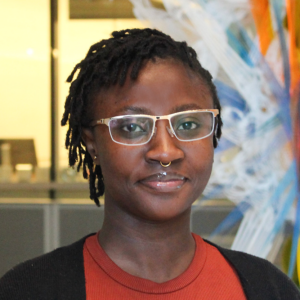
Wendy Abbey is a second-year graduate student in land and water engineering with Sara McMillan, professor of agriculture and biosystems engineering. Abbey’s research focuses on surrounding regenerative agricultural practices, looking at the effect of poultry manure application on cover crops and strip tillage on soil health, tile drainage, and climate. In addition to her research, she takes part in Engineers Without Borders, the Ghanaian Student Association, the Conservation Club, and the African Learning and Evolving Community.
Abbey became involved in soil and water conservation because of her passion for finding solutions to food insecurity, specifically in Africa.
“Feeding a growing population does not have to come at the cost of disrupting our ecosystems. Agriculture can be sustainable,” Abbey says.
Her main goal is to develop sustainable practices and ideas to conserve the ecosystem while continuing to improve food security.
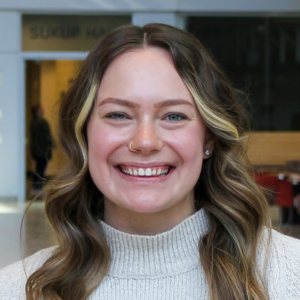
Nicole Geerdes is a PhD student studying environmental science with Adina Howe, associate professor of agriculture and biosystems engineering. Geerdes’ research consists of establishing plant growth promoting bacterial synthetic communities in perennial grass. This research can help identify how the climate affects these bacterial communities and their interactions with plants.
Geerdes completed her undergraduate degree in biology at the University of Northern Iowa. Coming to Iowa State has allowed her to expand her knowledge base in multiple disciplines on multiple levels.
“Here, I am able to do research with engineers, microbiologists, and environmental scientists,” Geerdes says. “This opportunity has given me breadth in my scientific knowledge as well as confidence in my ability to work with scientists from various backgrounds.
“Improving soil and water conservation offers far-reaching impacts to sustain and improve the natural resources that support us.”
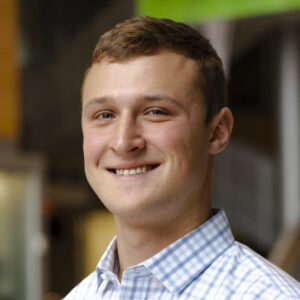
Eric Henning is a third-year PhD student studying agricultural engineering with Matt Helmers, professor of agriculture and biosystems engineering. Henning’s research theme is intensified water management to increase the sustainability of Iowa crop production. Henning also serves as the president of the department’s graduate student organization, the Agricultural and Biosystems Engineering Grad Org (ABEGO), and serves as a standards committee representative for the The American Society of Agricultural and Biological Engineers drainage group.
Henning’s interest in agricultural engineering sparked at an early age and has only intensified since. Some of the specific research he has been conducting in drainage water recycling allows for drainage water to be captured and then reused for irrigation. Sometimes this drainage can contain environmentally harmful loads of nutrients, however, using it as irrigation contains this challenge.
“What is exciting about this practice is that it can help both crop production and water quality,” says Henning.
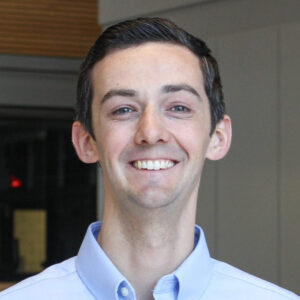
Phillip de Lorimier is in his first year of a master’s in environmental science with Adina Howe, associate professor of agriculture and biosystems engineering, and Marshall McDaniel, associate professor of agronomy. Lorimier’s research focuses on plant-soil-microbiome interactions in next-generation bioenergy cropping systems. A specific part of this research investigates patterns that could explain increased water-holding capacity in the perennial grass miscanthus relative to maize. Outside of research, Lorimier is involved in ABEGO, Environmental Science Graduates Student Organization, and Ecosystem Research Organization. Professionally, he is a member of the Soil Science Society of America and the American Society for Microbiology.
Lorimier became interested in this field of study during his undergraduate program at the University of California, Berkeley. The revelation that tiny microorganisms have such a large effect on overall soil and environmental health pushed Lorimier to pursue greater knowledge of trace genomics. “It was both a rewarding and challenging experience to interpret basic science into something useful at the farm gate,” Lorimier says.
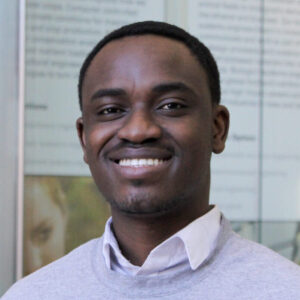
Oluwatuyi Olowoyeye is in his fourth year of his PhD, studying land and water resource engineering with Amy Kaleita, Larry and Bunita Buss Department Chair and professor of agriculture and biosystems engineering. His research focuses on computer models that quantify ecosystem services and benefits in regenerative agriculture. Specifically, Olowoyeye studies perennial groundcover (PGC) systems, to advance PGC systems allowing for both perennial grass and row crops to coexist year-round to reduce runoff and soil erosion. Combined with his research, Olowoyeye has been a leader in student organizations such as ASABE’s Young Professional Community, Towns and Colleges Toastmasters Club, Tau Beta Pi, and ABEGO.
Growing up in a community with water scarcity, Olowoyeye’s interest in soil and water conservation started at a young age. He has an undergraduate degree in agricultural and environmental engineering and a master’s in water management. Olowoyeye has continued his education at Iowa State to create positive changes at both local and global levels. “I remained in this field of study because soil and water conservation touches everything — from food security to medicine to technology,” Olowoyeye says.
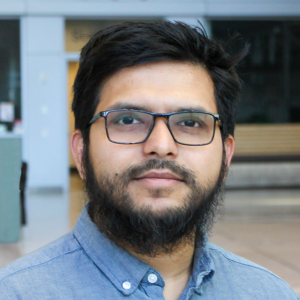
Najmuj Sakib is a second-year PhD student studying microbiology with Adina Howe, associate professor of agriculture and biosystems engineering, and Laura Jarboe, professor of chemical and biological engineering. Sakib’s research focuses on how environmental stressors in waste water can contribute to the spread of antibiotic resistance. This research looks at how stressors interact with microbial communities and potentially accelerate the evolution and transfer of antibiotic-resistant genes. Sakib is a member of ABEGO, the Microbiology Graduate Student Organization, and The National Institute of Antimicrobial Resistance Research and Education.
Sakib’s passion for his research topic stems from his experience growing up in Bangladesh, which experiences severe challenges with water management due to high temperatures and dense populations.
“Addressing these interconnected problems requires a multifaceted approach, including improved water infrastructure, advanced treatment technologies, and enhanced public health measures,” Sakib says.
Iowa State has provided him with the ability to not only continue his education but do it in an interdisciplinary manner.
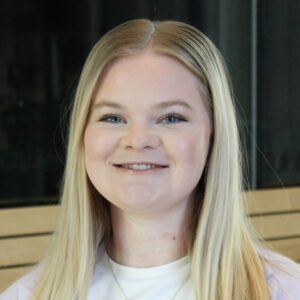
Taylor Vroman is a third-year PhD student studying environmental science with Michelle Soupir, professor of agriculture and biosystems engineering. Vroman’s current project is on microbial communities in woodchip and corncob bioreactors. The goal of her research is to improve the efficiency and performance of these bioreactors. Another project she is working on is expanding the use of bioreactors to possibly remove E. coli from waterways. On top of her studies, Vroman is involved in the Soil and Water Conservation Society and ABEGO.
Vroman has a background in reactor exploration; growing up near a nuclear power plant and her dad being a high school biology teacher allowed her interest to blossom early. She started by studying how the nuclear power plant affected water quality. “My passion for caring for the world around me has only grown with time,” Vroman says. “I love learning about the world, and using my gifts to help protect it.”
→ Learn more about graduate fellowships in the Department of Agriculture and Biosystems Engineering.
